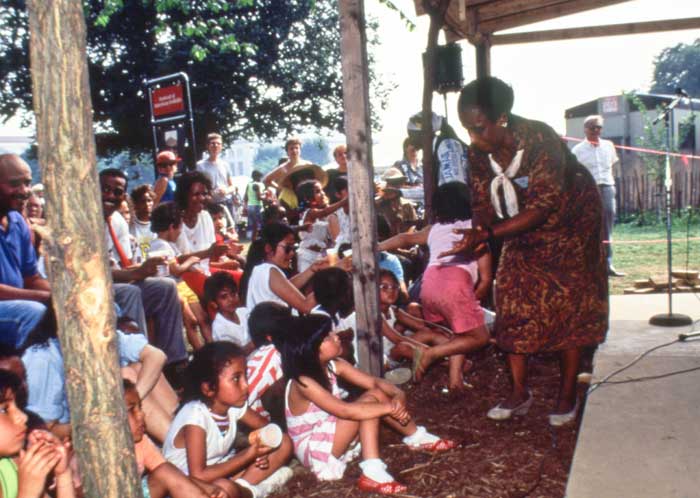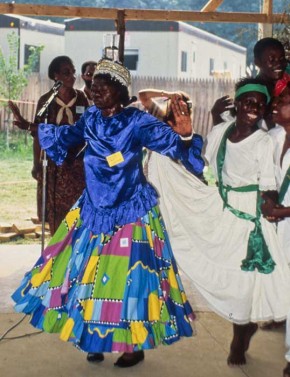Olive Lewin (1927-2013): A Life of Service

Dr. Olive Lewin—renowned Jamaican musicologist, folklorist, singer, actress, and community servant—transitioned last week at the age of eighty-five. She was a tireless advocate for Jamaican culture and folk music and is perhaps best known for the founding of three major organizations related to these interests: The Jamaican Folk Singers, the Jamaica Youth Orchestra, and the Memory Bank Project. The latter project began in 1981 with the support of the Honorable Edward Seaga, then the Prime Minister of Jamaica. It built upon and added to over twenty years of work that Dr. Lewin had already done in collecting songs and oral histories around the island. Presently, the African-Caribbean Institute of Jamaica holds more than 1,500 audio recordings of traditional Jamaican songs she made from 1966 through the term of the Memory Bank Project.
The work of bringing acknowledgement and popular recognition of the diverse African and ethnic sources of Jamaican music was not easy in a very hierarchal and Eurocentric society. During her own childhood, children were often punished for singing folk songs. Olive was among those who would change such attitudes. When she was appointed research officer with the Jamaica School of Music in January of 1966, she would travel for hundreds of miles on some occasions to, as she put it, “draw peoples tongues,” i.e., get them to talk and sing. While she felt passionately about the importance of the many local contacts she made, those who administered the School of Music often felt that it was a waste of time and resources to spend a whole day just recording one song. This did not deter Olive. Among the traditions she recorded were those of the Jamaican Maroons, Buru, Kumina, Ettu and Tambu groups, Dinkie Minnie, work songs, and pagwah and divili among Indo-Jamaican music. Not satisfied in just recording and transcribing such music, Olive wanted other Jamaicans to actually hear and appreciate the diverse sounds of their culture. It was this that inspired her to found the Jamaican Folk Singers in 1967.
During the 1970s Olive’s research into Jamaican folk culture led her to contact scholars and research institutions abroad that included the Smithsonian and the American Folklife Center at the Library of Congress. It was during this decade that she joined the International Council for Traditional Music (ICTM), an organization in which she would serve as vice-president.

I was lucky enough to meet Olive in the mid-1980s and later participate with her in fieldwork for the 1989 Folklife Festival, which had a Caribbean focus. During those three weeks in Jamaica, we travelled across the island—from the home of the Eastern Maroons in Moore Town in the Blue Mountains of Portland to Kingsvale in the parish of Hanover to Kingsvale, the home of Ettu, a Yoruba-derived tradition. It was through Olive that I got to meet several unforgettable personalities on that trip. These included Imogene Kennedy—otherwise known as “Miss Queeny,” one of Jamaica’s most legendary Kumina queens, and Mother Roberts, a Revival healer who practiced in the Mt. Zion Church of Moore Town.
In all of our travels it was clear that Olive was beloved by those she served and the many she encountered on the way. She always had time to pull over on the road and engage an elderly man or woman about a particular aspect of local knowledge. Accompanied by Hazel Ramsey, a long time colleague who worked with her on the Memory Bank Project, we enjoyed testing one another’s knowledge on these travels about Afro-Christian Revival songs. Olive, of course, knew many more than me, and knew them better. I, however, knew them through how they had flowed and been adapted into Rastafari Nyahbinghi music. This gave us an opportunity to amuse each other by singing the different versions as we knew them—something that sharpened our recognition of the borrowings between these two traditions. Our travels between parishes were never dull—but almost always punctuated by singing. For me, it was a great tutorial.
In 1991 I again had the opportunity to work with Olive as part of a Smithsonian “expedition” to Jamaica. The focus of the trip was an exploration of Indo-Jamaican culture and traditions as they were to be found in both rural and urban areas. The culmination of the trip was participating in the Indo-Jamaican celebration of Holi (which Jamaicans more commonly call Paghwah). The festival—which has been creolized in Jamaica—has many purposes, among them to celebrate the beginning of the new spring season. Held in the Hagley Park area of West Kingston, the highlight of the celebration was the “sound-clash” that took place between a reggae band across the street and the Hindi drums and chants in the Paghwah yard. Olive was crafty enough to have disappeared before the finale of the celebration—a free-for-all in which celebrants dance around a bonfire and throw colored powder at each other.
Whatever the tradition, Olive gave herself to it—sparing no effort in documenting, showcasing, and sustaining it. At a time when there were few others doing this kind of work, Olive Lewin pioneered the study and preservation of Jamaican traditional music and culture. With all of her many honors, she was first and foremost a servant of the communities and the nation that was her home.
Jake Homiak is a cultural anthropologist in the Smithsonian’s Department of Anthropology and director of the Department’s Collections and Archives Program. Since the early 1980s he has worked extensively in the English-speaking Caribbean with various African-Caribbean communities including Rastafari in Jamaica and the Eastern Caribbean. In 2007, with the assistance of a Rastafari Advisory Group drawn from across the region, Jake launched Discovering Rastafari, the first exhibit on the origins and international spread of the Rasta movement.

